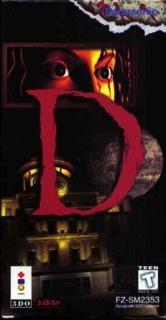A deranged horror masterpiece
You play as Laura, the daughter of a renown doctor who, out of the blue, starts murdering innocent people in an L.A. hospital. The police ask her to investigate why he's gone mad, but once she enters the hospital she comes upon a strange portal. Like Laura, once you step through that portal, the comfortable, familiar reality you live in will suddenly crack open, and you'll plunge into a nightmarish world concocted by her fathers' mind. At first it seems you've only entered an old manor, but you'll immediately notice that something about it feels distorted. It's eerie and oppressive in every way, from the austere, claustrophobic design of the manor itself, built in weighty slab stones, to its dark baroque furniture and somber decoration patterns. As you slowly trot about, step after step after step, the sounds of footsteps echoing through the deserted halls, your eyes examining your surroundings, you come to understand that, like the dreamy fabric of your mind's thoughts, the old house pays little heed to the enclosing limitations of physical reality. Its architecture and design is odd and impossible to replicate in the real world, not to mention that it's filled with strange contraptions and deadly traps filled with corpses. And, like a typical haunted house, there's always something odd and disconcerting waiting to jump out when you slowly turn the next corner.
Exploring that strange realm is handled like in "Myst": a lonely adventure game in which you go about solving puzzles to find out more about the story that has passed. But whereas "Myst" strived on players' sense of discovery and awe when faced with its aesthetic beauty and hidden secrets, "D" prefers to instill an eerie atmosphere of anticipation and dread face its hidden revelations. Inside that dark-stricken world, the atmosphere is cut-throat, with the slow tempo of the electronic soundtrack building up tension and giving emotional density to the limited detail of the pre-rendered visuals. But when there's a new narrative revelation, you can see Laura's face exploding with emotion (such boldness in an 1995 video-game!), and the game shifts into a barrage of super-fast, surreal imagery, which, like the memories of an amnesiac, are completely fragmented, only adding to the insanity and madness that surrounds you. The aesthetic and emotional contrast between those two moments is overwhelming, as you go from a vacant world of dead grays and quiet loneliness to a torrent of violent, blood-stricken images accompanied by a pounding soundtrack. This is Kenji Eno's work at its best, crafting specific moods for the player to sink in, so that the game plays the player as if he were a piano: gently pacing him with a melancholic tune, quieting him until he settles in, only to then have him instantly revived with a powerful new crescendo that takes him to an emotional climax. It's almost as if Eno, who sports an extensive musical background, crafted the game as you'd compose music, trying to convey strong emotional impressions and abstract rationales, instead of devising something that could be deconstructed literally.
That is what ultimately elevates "D" to a horror masterpiece, the fact that its authors understood that the fundamental pillar of a horror piece lies in a sense of unknown and illogical, that can put players in an uncomfortable mindset which eventually leads to fear and foreboding. Even when the game comes into a conclusion, its mysteries are never fully revealed; what is unhooded serves only to add a whole new layer of interpretation – a frightening allegory over man's transformation into monster – but its revelations never change the amorphous, bizarre and surreal nature of the tale. Nothing ever makes much sense in "D", and the game is all the better because of it. At the very least, one must acknowledge "D's" impact in its genre, with its tentaclous influences reaching the very best of the genre, from "Resident Evil" (the wonderful first person perspective doorway opening and stair-climbing sequences) to "Silent Hill" (in terms of the surreal ambiance). But "D" is a masterpiece by its own merit, a game that accomplishes that which so oft eludes video-games: the capability to provoke strong emotional reactions in players. And "D" can invoke in you such a host of visceral, sub-dermal and subconscious responses, that it will give you a whole new appreciation for horror video-games.

